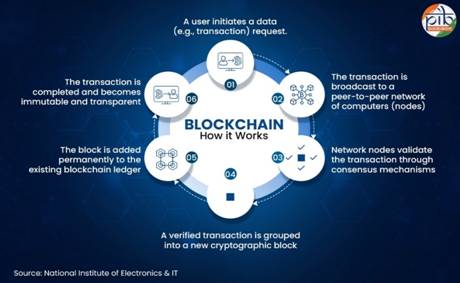Blockchain and the National Blockchain Framework (NBF)

- 30 Oct 2025
In News:
Blockchain technology, once associated primarily with cryptocurrencies, has emerged as a transformative tool for establishing digital trust, enhancing transparency, and reducing systemic inefficiencies in governance. India, aiming to modernise its public service delivery architecture, has adopted a strategic approach through the National Blockchain Framework (NBF), launched in September 2024 with a budget of ?64.76 crore.
Understanding Blockchain Technology and Its Governance Utility
- Blockchain is a distributed, immutable and cryptographically secure ledger of transactions maintained across multiple nodes. Its inherent strengths—tamper resistance, decentralisation, and transparency—make it an ideal backbone for public data systems.
- India’s governance needs are best served by permissioned private blockchains, where authorised entities validate transactions while ensuring confidentiality. Other blockchain variants—public, consortium, and hybrid models—offer differing levels of access and decentralisation but are less suited for sensitive government datasets.
Core Architecture of the National Blockchain Framework
1. Vishvasya Blockchain Stack
At the heart of the NBF is the Vishvasya Blockchain Stack, an indigenous and modular platform offering:
- Blockchain-as-a-Service (BaaS) to enable rapid deployment of blockchain applications without the need for independent infrastructure.
- Distributed infrastructure across NIC data centres in Bhubaneswar, Pune, and Hyderabad for resilience and fault tolerance.
- Permissioned blockchain layer, ensuring participation only by verified entities.
- Open APIs and integration services that simplify connectivity with existing e-governance platforms.
2. NBFLite – Sandbox for Innovation
- NBFLite provides startups, researchers, and academic institutions with a controlled environment to prototype blockchain solutions using pre-configured smart contract templates for supply chains, certificates, and governance use cases.
3. Praamaanik – Mobile App Verification
- Praamaanik uses blockchain to verify the authenticity of mobile applications, protecting users from counterfeit apps and fraudulent customer support platforms.
4. National Blockchain Portal
- This serves as the unified gateway for guidelines, standards, and adoption roadmaps, promoting interoperability across sectors.
Blockchain-Enabled Chains Transforming Public Service Delivery
- Certificate and Document Chain: Government agencies use blockchain for secure issuance, storage, and verification of documents such as academic records, ration cards, driving licences, and birth/death certificates.Over 34 crore documents have been verified using this system.
- Logistics Chain: Used for tracking goods across supply stakeholders.Example: Karnataka’s Aushada system tracks medicines from manufacturers to hospitals, ensuring authenticity, preventing spurious drugs, and improving traceability.
- Property Chain: Immutable records of property transactions help reduce land disputes, establish ownership clarity, and expedite land transfers.
- Judiciary Chain and ICJS: Blockchain supports electronic delivery of summons, bail orders, and judicial notices.The Inter-operable Criminal Justice System (ICJS) integrates evidence, case files, and judicial documents across agencies for seamless coordination.
Sectoral Adoption by National Regulators
- TRAI employs Distributed Ledger Technology to monitor SMS transmission, reducing spam and enhancing regulatory compliance for over 1.13 lakh entities.
- RBI uses blockchain for its Digital Rupee (e?) pilot, demonstrating secure, traceable digital payments.
- NSDL has adopted blockchain for Debenture Covenant Monitoring, enabling time-stamped, tamper-proof monitoring of asset cover and compliance.
Capacity Building and Skill Development
MeitY has trained 21,000+ officials on blockchain applications. Academic initiatives—PG Diploma in FinTech & Blockchain, C-DAC’s BLEND programme, and FutureSkills PRIME—are developing specialised talent for India's blockchain workforce.
Way Forward
India is testing blockchain-based solutions for land records, GST chain, blood bank management, and PDS transparency. The NBF represents a strategic shift from fragmented digital systems to a unified trust-based digital governance model, positioning India as a global leader in blockchain-enabled public services.
